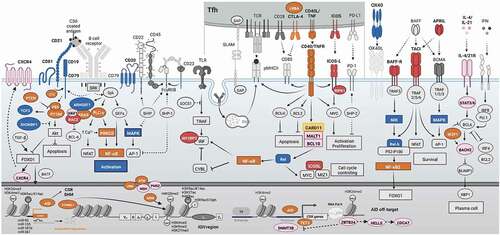Figures & data
Figure 1. Main cytokine/antigen stimulations, T cell cross-linkages, intracellular signaling pathways, activated transcription factors, gene transcriptions, and epigenetic regulators during the process of class switch recombination of B cells. Monogenic diseases in humans leading to only infectious complications are blue, molecules involved only in autoimmunity are shown in red, molecules involved only in lymphoproliferation/malignancy are shown in yellow, molecules involved both in autoimmunity and lymphoproliferation/malignancy are shown in orange, and the rest of the molecules with noninfectious complications are shown in pink (for details, please see ).

Table 1. Known human inborn errors of immunity with defects in CSR, cytokine, and transcription factors associated with noninfectious complications.
